- Home
- Claudia Mills
Fourth-Grade Disasters
Fourth-Grade Disasters Read online
THIS IS A BORZOI BOOK PUBLISHED BY ALFRED A. KNOPF
This is a work of fiction. Names, characters, places, and incidents either are the product of the author’s imagination or are used fictitiously. Any resemblance to actual persons, living or dead, events, or locales is entirely coincidental.
Text copyright © 2011 by Claudia Mills
Jacket art and interior illustrations copyright © 2011 by Guy Francis
All rights reserved. Published in the United States by Alfred A. Knopf, an imprint of Random House Children’s Books, a division of Random House, Inc., New York.
Knopf, Borzoi Books, and the colophon are registered trademarks of Random House, Inc.
Visit us on the Web! www.randomhouse.com/kids
Educators and librarians, for a variety of teaching tools,
visit us at www.randomhouse.com/teachers
Library of Congress Cataloging-in-Publication Data
Mason Dixon : fourth-grade disasters / by Claudia Mills. — Hardcover ed.
p. cm. — (Mason Dixon ; #2)
Summary: Mason Dixon is his usual pessimistic self as he starts fourth grade, dreading joining the school choir and unenthused about his sports-obsessed teacher, who plans for the students to be “making a full-court press on writing.”
eISBN: 978-0-375-89959-1
[1. Schools—Fiction. 2. Singing—Fiction. 3. Pessimism—Fiction. 4. Friendship—Fiction.] I. Title. II. Title: Fourth-grade disasters.
PZ7.M63963Maf 2011
[Fic]—dc22
2010048721
The illustrations in this book were created using pen and ink.
Random House Children’s Books supports the First Amendment and celebrates the right to read.
v3.1
To Jennifer Teets
Contents
Cover
Title Page
Copyright
Dedication
Chapter 1
Chapter 2
Chapter 3
Chapter 4
Chapter 5
Chapter 6
Chapter 7
Chapter 8
Chapter 9
Chapter 10
Chapter 11
Chapter 12
Chapter 13
Chapter 14
Acknowledgments
About the Author
Excerpt from Mason Dixon: Basketball Disasters
1
“Fourth grade!” said Mason Dixon’s mother as she sat on the family-room floor surrounded by bags of school supplies. “Tomorrow is the first day of fourth grade!”
Lying on the floor next to her, Mason tried not to scowl. He must not have succeeded, because she said, “Stop frowning! Fourth grade is wonderful. It will be your best year yet!”
That wasn’t saying much. Third grade had meant sitting next to Dunk Davis instead of sitting next to Brody Baxter. Second grade had been Mrs. Prindle, who didn’t like boys. First grade had been a broken arm, when Mason fell off the climbing bars. And kindergarten—well, the less said about Mason’s biggest kindergarten disaster, the better.
Beside him on the floor, Mason’s dog, Dog, snored peacefully. Dog obviously wasn’t impressed by the thought of fourth grade. Mason felt a surge of love for Dog, a three-legged golden retriever who had come to live with him two months ago.
“Go sharpen your pencils,” Mason’s mom said. “I’ll put your name on your notebooks. I just love brand-new school supplies, don’t you?”
Actually, Mason didn’t. The trouble with brand-new school supplies was that they were brand-new school supplies.
“I’m so glad you and Brody are in the same class again,” she went on.
That was one thing Mason was glad about, too.
“Do you remember that time when Brody was absent in preschool and you went up to another child and said, ‘Let’s pretend you’re Brody’? Your teacher told me that. It was the cutest thing.”
Mason felt his scowl deepen. He had already heard the story fifty times. Maybe sixty.
“This year you’ll finally get to be in the Plainfield Platters!” his mom said.
The Plainfield Platters was the huge school chorus that practiced before school two mornings a week, open to all fourth and fifth graders. As far as Mason could tell, all fourth and fifth graders were in it. But surely, in the history of Plainfield Elementary, there must have been at least one fourth grader who wasn’t.
“Um—I don’t like to sing,” Mason reminded her, since she had apparently forgotten.
“You have a lovely singing voice!”
Mason couldn’t remember any time that she had heard him sing. It wasn’t an activity he ever engaged in voluntarily.
In kindergarten, Mason’s class had had to sing a song for a school assembly, presumably to show all the bigger kids how adorable they were. The song went, “I’m a little teapot, short and stout.” At the end of the song, when the little teapot got all steamed up and ready to shout, “Tip me over and pour me out!” Mason had tipped himself too far and fallen over, right there in the middle of the front row. The whole school had burst into laughter mingled with cheers, or maybe it had been laughter mingled with jeers.
It had been the worst moment of Mason’s entire life. He still dreamed about it sometimes.
“I don’t like to sing,” Mason repeated. Especially not in front of the whole school. “I’m not what you would call a singing person. I don’t want to be in the Plainfield Platters.”
And I’m not going to be, he added, but only to himself.
“Mason.” Now it was her turn to frown. “We’re not going to have another year with a negative attitude. Your father and I have been talking about this. If you expect rain, you’ll get rain. If you expect sun, you’ll get sun.”
That might be the single falsest statement Mason had ever heard.
“You expected sun on my birthday,” he pointed out, “for my outdoor birthday party at Water World. And what did you get?”
“Mason, you know what I mean.”
Mason rolled over so that he was lying facedown, his nose squished against the scratchy carpet. In his sleep, Dog must have sensed Mason’s presence; Dog’s long tail thumped twice. That would be another bad thing about school: leaving Dog all day. Fourth grade wouldn’t be so bad if Dog could be there, too.
And fourth grade wouldn’t be so bad if there weren’t the bizarre expectation that every single fourth grader would stand up on the stage in front of hundreds of people and sing. Oh, and sing while doing the occasional lively dance step as well. In addition to not being a singing person, Mason wasn’t a dancing person. Most of all, he wasn’t a being-up-onstage-in-front-of-everybody person.
It would be even worse if a big fourth grader fell over while trying to impersonate a tipping and pouring teapot. And Mason hadn’t thought his kindergarten calamity was all that amusing in the first place.
“Now go sharpen your pencils,” Mason’s mother said. “There’s nothing like a bunch of freshly sharpened pencils on the first day of school!”
Mason groaned.
“Mason! Go sharpen your pencils!”
Mason went.
Brody came over later that afternoon, to see Mason, of course, but also to see Dog. Mason and Brody shared Dog. Brody couldn’t have a dog of his own because his father was desperately allergic to all pets except Brody’s goldfish, Albert. In fact, Brody had been the reason Mason got Dog: Dog was supposed to be Brody’s dog, but lived next door at Mason’s house.
For a while Mason hadn’t even liked Dog, hard as that was to believe now. Mason had thought he wasn’t a pet person, but he had turned out to be wrong about that. Though not completely wrong. He still wasn’t a pet person. But he was Dog’s person. And Bro
dy was Dog’s person, too.
Brody came staggering under the weight of a huge paper sack, which he placed carefully on the floor before swooping down on Dog for a hug. Dog licked Brody’s face, his neck, his hands, any part of Brody that was lickable.
“What’s in the bag?” Mason asked Brody once Dog’s licking was completed.
“My school supplies! I thought we could compare school supplies.”
Mason stared at Brody. Even for Brody, the most enthusiastic person on the planet, this was a bit much.
“Compare school supplies?” Mason repeated in a strangled voice.
“You know, show each other what kind of markers we got, and how many colored pencils we have in our colored-pencil boxes, and if we got anything special. Like, I have a tiny little stapler with miniature staples in it, and my own personal pencil sharpener so I can sharpen pencils right at my desk if I don’t want to get up to walk all the way across the room to sharpen a pencil.”
“I already sharpened mine,” Mason said. “My mother made me.”
“I already sharpened mine, too—of course I did—but, Mason, they’re not going to stay sharpened all year long. So that’s when I’ll use my own personal pencil sharpener, shaped like—” Brody’s voice broke off. “Guess what it’s shaped like!”
Mason couldn’t begin to guess. “I give up.”
Brody glowed with pleasure at having stumped Mason.
“It’s shaped like—a dog! I think it even looks a little bit like Dog.”
Brody dug in his sack for the pencil sharpener, pulling out heaps of notebooks with bright, busy covers: pictures of dogs, of cats, of all kinds of fish. Mason’s notebooks were plain, solid colors: red, yellow, green. He had wanted them all the same color, brown (to match the brown socks he wore every day), but the store didn’t sell brown notebooks. Besides, his mother had said it would be better to have a different color for each subject. She had obviously given a lot of thought to the notebook issue.
“Here it is!”
Brody held out his pencil sharpener, which did look sort of like Dog. The pencil-sharpening hole was in the dog’s tail.
“Cool,” Mason said, since he had to say something.
“Okay, Mason,” Brody announced after a long pause to give Mason time to appreciate the pencil sharpener in its full glory. “Are you ready for a surprise? Because I have a surprise for you!”
Mason generally didn’t like surprises. But he couldn’t imagine that Brody’s surprise would be anything too terrible.
“Sure,” he said guardedly.
Brody held out a twin dog-shaped pencil sharpener, which he had been hiding behind his back. “I got one for you, too! Because we’re best friends, and co-owners of Dog. Now we’ll have matching dog pencil sharpeners!”
Mason returned Brody’s grin. It was weird to have a best friend who was so excited about a pencil sharpener, but Mason had nothing against weirdness. Some people even thought that he himself was a tiny bit unusual.
“And wait till you see my eraser!” Brody went on. “You aren’t going to believe my eraser!”
This time Mason felt more comfortable venturing a guess. “It’s shaped like a dog.”
“It is! And guess what, Mason.”
“You got one for me, too.”
Triumphantly, Brody pulled two matching dog-shaped erasers out of his sack.
“Ta-dah!”
“Wow. Thanks, Brody,” Mason said. What else could he say with Brody’s face shining like that?
“So it will be like having Dog there with us at school. Fourth grade is going to be great!”
Mason wanted to say that having a dog-shaped pencil sharpener and a dog-shaped eraser was nothing at all like being with a real, live Dog. And he strongly suspected that fourth grade was not going to be great. The best he could hope for was bearable. Being in the Plainfield Platters was not even going to be bearable.
Before Brody could show him any more school supplies, or start talking about how wonderful it was going to be to join the Platters, Mason jumped up and said, “Let’s take Dog for a walk.”
Brody cast one longing glance back at his sack, but then he jumped up, too. Dog had already dashed into the kitchen and returned with his leash in his mouth.
“This is the last walk we’ll ever take with Dog before we’re officially fourth graders,” Brody said solemnly. “I mean, we were sort of fourth graders once third grade ended, but we were also sort of nothing—in between, not anything. So this is our last walk as not yet really, truly fourth graders.”
Mason knew Brody meant his comment to highlight the grandeur of the moment, but to his ears, it had a doomed sound.
Tomorrow Mason would be a really, truly fourth grader, armed only with a dog-shaped pencil sharpener and a dog-shaped eraser.
He took the leash from Dog with a heavy heart.
Then Dog spied something in Mason’s heap of school supplies and pounced on it. Mason couldn’t see what it was, but he knew it wasn’t something Dog should be eating.
“Dog, drop that!” Mason commanded.
Dog kept on chewing, and then he swallowed it, whatever it was.
Mason looked back at the school supplies to see what was missing.
There was no longer any dog-shaped eraser in the pile.
So tomorrow Mason would be a really, truly fourth grader, armed only with a dog-shaped pencil sharpener.
A really, truly fourth grader who would really, truly be expected to sing and dance in front of everybody.
2
Mason’s fourth-grade teacher was a man. Other teachers at Plainfield Elementary had normal names, like Mrs. Prindle and Mrs. Oliphant. Not that those were completely normal names, but at least they were teacher-sounding names. This teacher called himself Coach Joe.
“Good morning, team!” he shouted once everyone had found a desk.
Mason was impressed that Coach Joe was letting kids choose where to sit. Mason chose to sit next to Brody, of course, which meant sitting in the front row, because Brody loved the front row. Tall, skinny Nora Alpers, who had become a friend last summer when they had all been in summer art camp together, sat on Mason’s other side. Mason was relieved that Dunk Davis chose a seat in the farthest corner of the back row.
“All right, team! Come on up for a huddle!”
A huddle must be a class meeting. The students gathered on the football-shaped rug in front of Coach Joe’s stool.
Coach Joe clearly loved sports. Mason hated sports. So this was a first clue that, despite his getting to sit next to Brody and far away from Dunk, fourth grade was not going to be a good year. Mason sighed, a deep, wrenching sigh that took every molecule of air right out of his lungs. No one seemed to notice, except for Nora, who noticed everything.
Sitting two kids away from Mason in the huddle, Dunk did a few boxing motions in the air, as if to demonstrate his readiness to enter the ring. Dunk’s big mean dog, Wolf, had attacked Dog last summer and almost killed him. Or at least might have killed him.
It was unfortunate that Dunk had happened to walk by Mason’s house before school that morning as Mason’s mother had him posed outside by the front door, smiling grimly, holding his bulging bag of school supplies, for the first-day-of-school photo that she took every year. Dunk now interrupted his boxing to pretend to snap a picture of Mason and then doubled over laughing.
“Okay, team!” Coach Joe said. “Listen up!”
Coach Joe’s hair was cut short in a bristling crew cut. He didn’t wear a whistle on a string around his neck, but if he had, it wouldn’t have looked out of place.
“Today is the kickoff for fourth grade,” Coach Joe said. “If we’re going to have a winning season this year, we have to have a winning attitude.”
Mason couldn’t believe it. First his mother, now his teacher.
Sitting next to Mason in the huddle, Brody gave a huge grin. If anybody had a winning attitude, Brody did. In second grade, Brody had even liked Mrs. Prindle.
“
No team,” Coach Joe continued, “has ever won the Super Bowl, or the World Series, or the NBA Championship without a winning attitude.”
So that made three things Mason wasn’t going to win.
The public address system clicked on. It was time for the Pledge of Allegiance, morning announcements, and the singing of the school song.
The students all stood up, crowded together on the football-shaped rug, and turned to face the large flag hanging by the front whiteboard. Mason saw Dunk shove the kid standing next to him; the other kid shoved him back.
Mason joined with the rest of the class in saying the pledge. He half listened to the announcements. The school lunch today was chicken nuggets. Mason was glad he had brought a peanut butter and jelly sandwich from home. Then again, he always brought the same lunch from home: a peanut butter and jelly sandwich, a small apple, and four Fig Newtons.
Then Mason heard the principal say, “The Plainfield Platters will begin practice next week before school on Tuesday and Friday mornings, starting this coming Tuesday.”
It was Thursday now—for some reason, a new school year always started on a Thursday—so Tuesday was five days away.
“The Platters are open to all fourth and fifth graders who love to sing.”
That left out Mason.
When the announcements came to an end, the tape-recorded piano music for the school song, “Puff the Plainfield Dragon,” started to play. Brody bellowed the song at the top of his lungs. Nora, Mason observed, was barely singing at all. Dunk punctuated the song with jabs to the shoulder of the boy he had been shoving before; the boy jabbed back. Coach Joe, busy singing himself, didn’t seem to notice, but then, without missing a word of the song, he moved over toward Dunk, and suddenly Dunk was standing somewhere else.
During the song, Mason opened his mouth partway so it wouldn’t be too obvious that no sound was coming out of his body. Mason wasn’t about to sing in front of other people, even if no one else was looking at him because they were all too busy singing themselves.
“Puff is loved by everyone, because he is so cool!” the other students sang. “Every day we shout hooray that Puff lives at our school!”

 Standing Up to Mr. O.
Standing Up to Mr. O.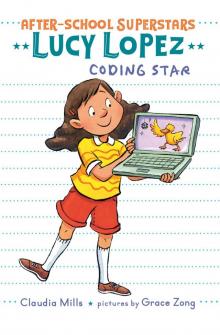 Lucy Lopez
Lucy Lopez Dinah Forever
Dinah Forever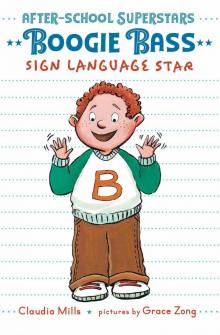 Boogie Bass, Sign Language Star
Boogie Bass, Sign Language Star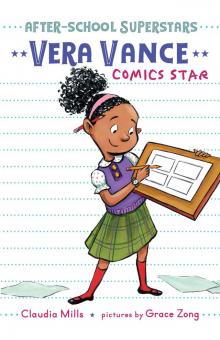 Vera Vance: Comics Star
Vera Vance: Comics Star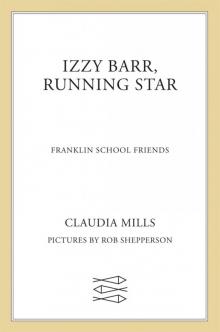 Izzy Barr, Running Star
Izzy Barr, Running Star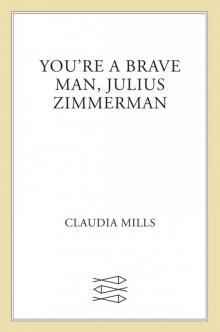 You're a Brave Man, Julius Zimmerman
You're a Brave Man, Julius Zimmerman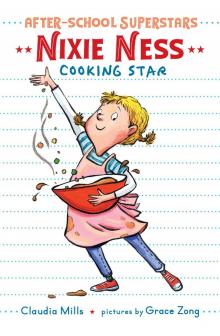 Nixie Ness
Nixie Ness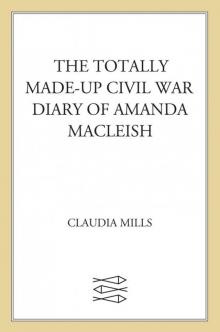 The Totally Made-up Civil War Diary of Amanda MacLeish
The Totally Made-up Civil War Diary of Amanda MacLeish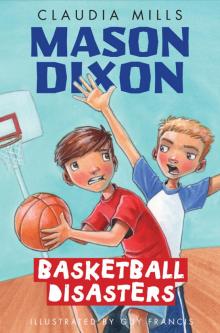 Basketball Disasters
Basketball Disasters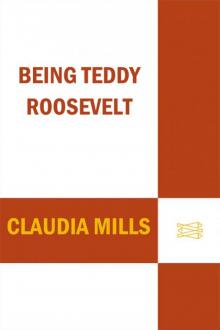 Being Teddy Roosevelt
Being Teddy Roosevelt Losers, Inc.
Losers, Inc. The Trouble with Friends
The Trouble with Friends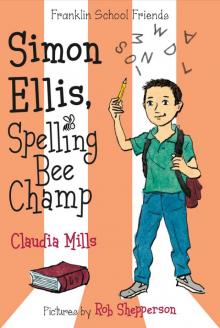 Simon Ellis, Spelling Bee Champ
Simon Ellis, Spelling Bee Champ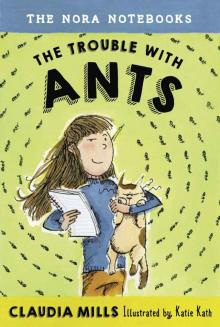 The Nora Notebooks, Book 1: The Trouble with Ants
The Nora Notebooks, Book 1: The Trouble with Ants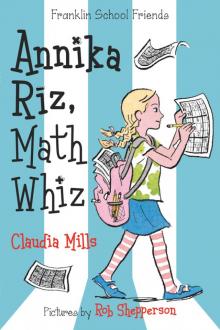 Annika Riz, Math Whiz
Annika Riz, Math Whiz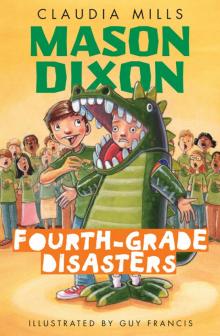 Fourth-Grade Disasters
Fourth-Grade Disasters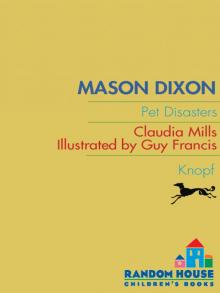 Pet Disasters
Pet Disasters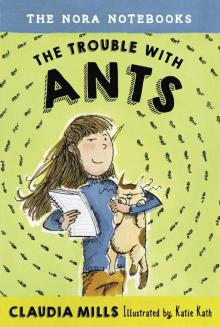 The Trouble with Ants
The Trouble with Ants Write This Down
Write This Down Alex Ryan, Stop That!
Alex Ryan, Stop That!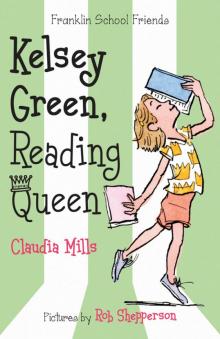 Kelsey Green, Reading Queen
Kelsey Green, Reading Queen How Oliver Olson Changed the World
How Oliver Olson Changed the World Lizzie At Last
Lizzie At Last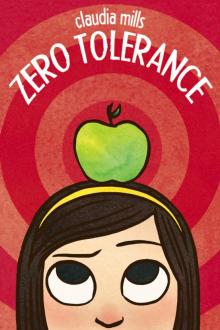 Zero Tolerance
Zero Tolerance The Nora Notebooks, Book 2
The Nora Notebooks, Book 2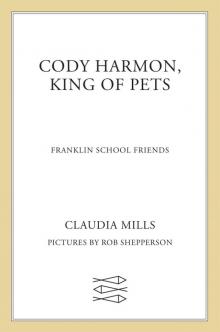 Cody Harmon, King of Pets
Cody Harmon, King of Pets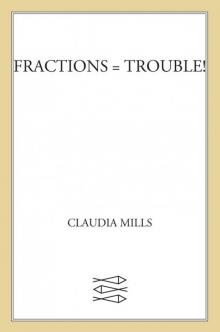 Fractions = Trouble!
Fractions = Trouble! Makeovers by Marcia
Makeovers by Marcia One Square Inch
One Square Inch